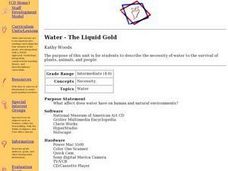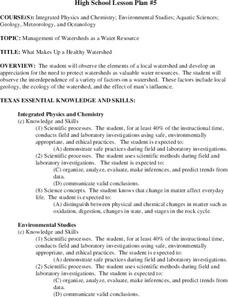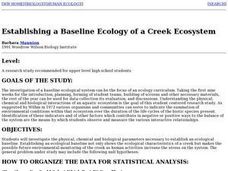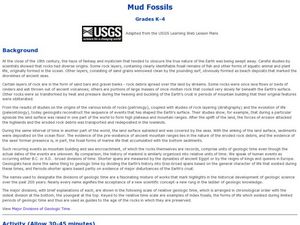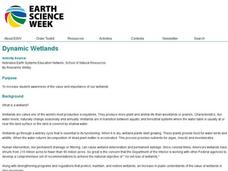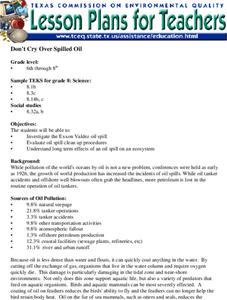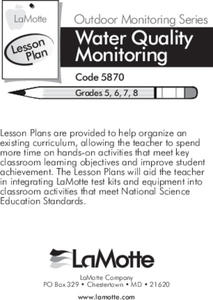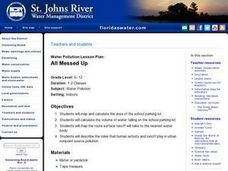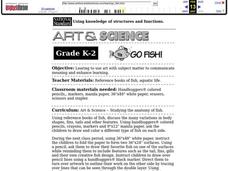Curated OER
Critter Clues
Students work together to examine water quality. They identify the indicators of water quality and complete an experiment. They discuss their results.
Curated OER
Water-The Liquid Gold
Students investigate the necessity of water for the survival of plants, animals, and people. They explore the affect that water has on human and natural environments through literature, field trips, and discussions.
Curated OER
What Makes Up a Healthy Watershed
Students, after observing the elements of a local watershed, explore the need to protect watersheds as water resources for the future. They examine the factors involved with a watershed: geology, ecology, and the effect of man's...
Curated OER
Establishing a Baseline Ecology of a Creek Ecosystem
Students investigate the physical, chemical and biological parameters necessary to establish an ecological baseline. Establishing an ecological baseline not only shows the ecological characteristics of a creek but makes the possible...
Curated OER
From Eggs to Frogs
Third graders receive a small container of tapioca pudding, they are to pretend that it is frog eggs. The students pretend they are birds who see the eggs, and eat some of them. They discuss what would happen if these were really frog...
Curated OER
Happy in My Habitat
Fourth graders create animal habitats and explain the biomes they live in. In this habitat lesson, 4th graders recognize the basic needs of animals, characteristics of animals differences and places where they live. Students complete...
Curated OER
3-D Model of Lake Benthos
Students create 3-D models of Lake Benthos. In this scale drawing lesson, students create a 3-D model of Lake Benthos. Students work in groups to create the models. Students use the models to to encourage people to conserve natural...
Curated OER
Mud Fossils
Learners observe real fossils. In this science lesson, students make their own mud fossils by pressing material into the mud and letting it dry in the sun for 3-4 days. Learners then get the fossils out displaying their mud fossils.
Curated OER
Dynamic Wetlands
Students construct and observe a model of two different types of wetlands. In this wetlands lesson, students create a model of a wetland with constant drainage and a wetland that maintains a well-saturated soil. Students observe and...
Curated OER
Earth's Biomes
Tenth graders examine characteristics and animals of terrestrial biomes. For this Earth's biomes lesson, 10th graders view a PowerPoint, take noes, sort pictures, research biomes, and create a diorama of a biome for presentation.
Curated OER
Animal Adaptations
Students focus on the pelts of fur-bearing animals native to Iowa to discover their different adaptations. In this animal adaptation lesson, students work in groups and examine various pelts to find information about the animals habitat...
Curated OER
Fishing
Students explore the techniques and basic needs of the fisherman. For this fishing lesson, students view a demonstration of the use of fishing equipment. Students research Iowa farm ponds and design a class mural from their...
Curated OER
Ecosystem In A Bottle
Ecosystem activities show how everyone and everything is interconnected. The smallest change can make a big impact.
Curated OER
Don't Cry Over Spilled Oil
Students study the Exxon Valdez Oil Spill while evaluating oil spill clean up activities. They discover the long term impact can have on an ecosystem by completing this experiment.
Curated OER
Water Quality Monitoring of Natural Water
Young scholars create their own monitoring program for natural water. They collect samples from an appropriate sampling site. They perform chemical and biological analyses of their samples. They present their information to the class.
Curated OER
Water Quality Monitoring of Natural Water
Students set up their own monitoring system. They collect samples from an appropriate sampling site. They analyze data and determine the water quality. They present their information to the class and draw a conclusion.
Curated OER
What Are We?
Students describe different types of water pollutants. They complete experiments in which they observe the affects of water pollution on algae. They also brainstorm and list three causes of each water pollutant.
Curated OER
All Messed Up
Pupils begin the experiment by mapping and calculating their school parking lot. They calculate the volume of water falling on the lot and map the route the water runoff takes. They discuss the roles that humans play in affecting water...
Curated OER
An Antidote to Plagiarism
Young scholars discover how to write a research paper without directly copying written material. They read a passage, then record on the board any words that are new for them. They define these words, then organize their facts to create...
Curated OER
Go Fish
Students use art with subject matter to communicate meaning and enhance learning.
Curated OER
Beaches of the Delaware Estuary
Students examine estuaries in Delaware. They, in groups, gather samples of water to find organisms and identify them.
Curated OER
Biodiversity Debate
Ninth graders debate the positive aspects of dam construction. They discuss how a dam changes the ecosystem. In groups, 9th graders research and gather information for a debate. They state their position and write a report supporting it....
Curated OER
Macroinvertebrate Sampling
Students identify macroinvertebrate species to investigate ecological systems and the relationship between humans and the environment.
Curated OER
Mollusks
In this mollusks activity, students will review the characteristics of the three major classes of mollusks: gastropods, bivalves, and cephalopods. This activity has 17 matching, 6 short answer, 9 fill in the blank, and 4 true or false...
Other popular searches
- Aquatic Life Basic Needs
- Aquatic Life Food Chain
- Aquatic Life Form
- Aquatic Life Current Events
- Aquatic Life Animals
- Fish and Aquatic Life
- Marine Aquatic Science
- Measurement and Aquatic Life
- Aquatic Life Lake Michigan
- Aquatic Life Rationale
- Aquatic Life and Pollution



